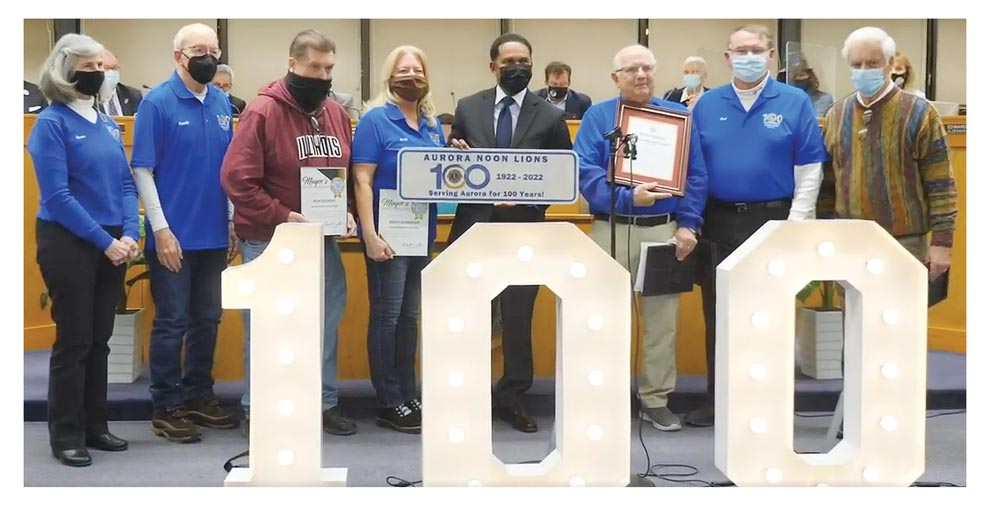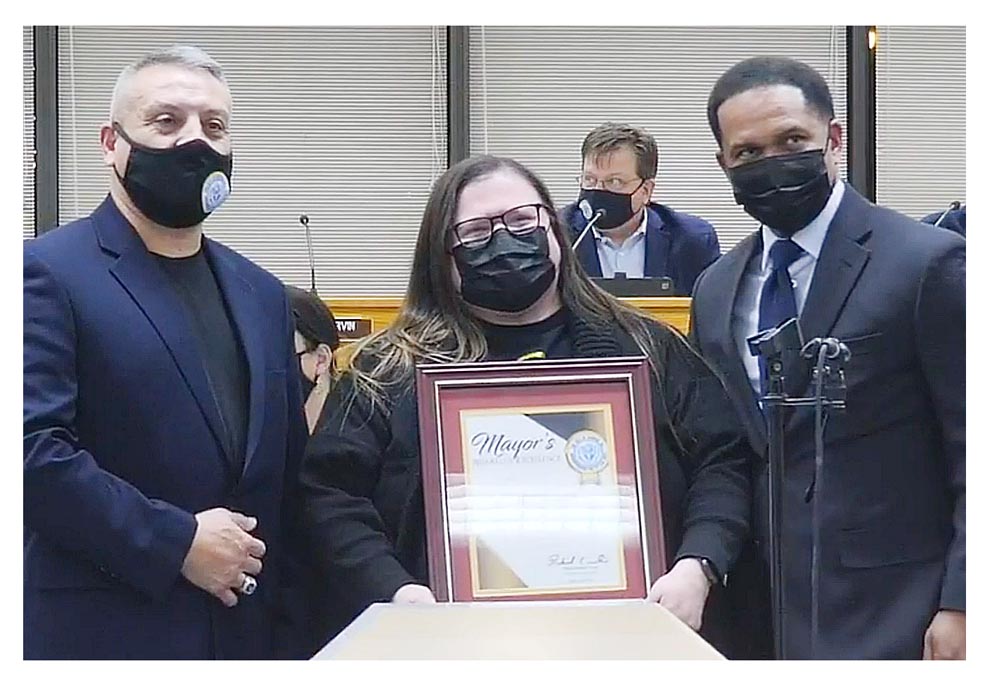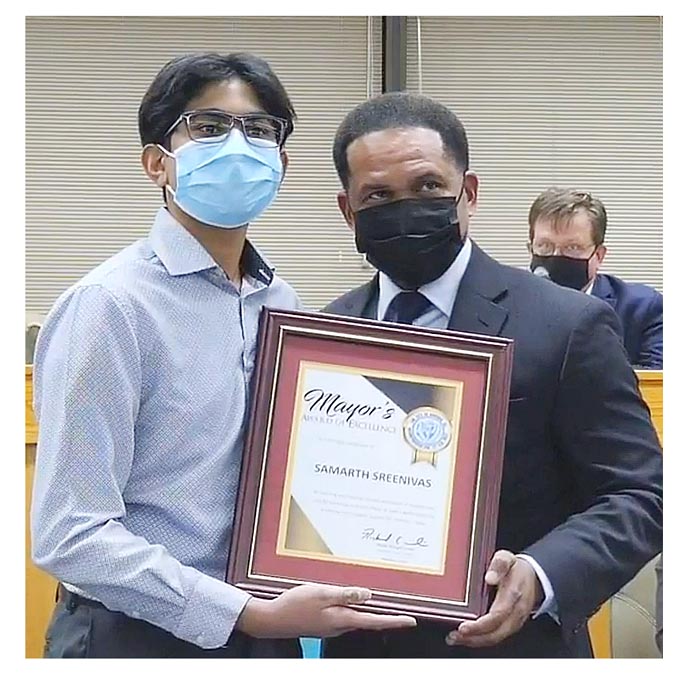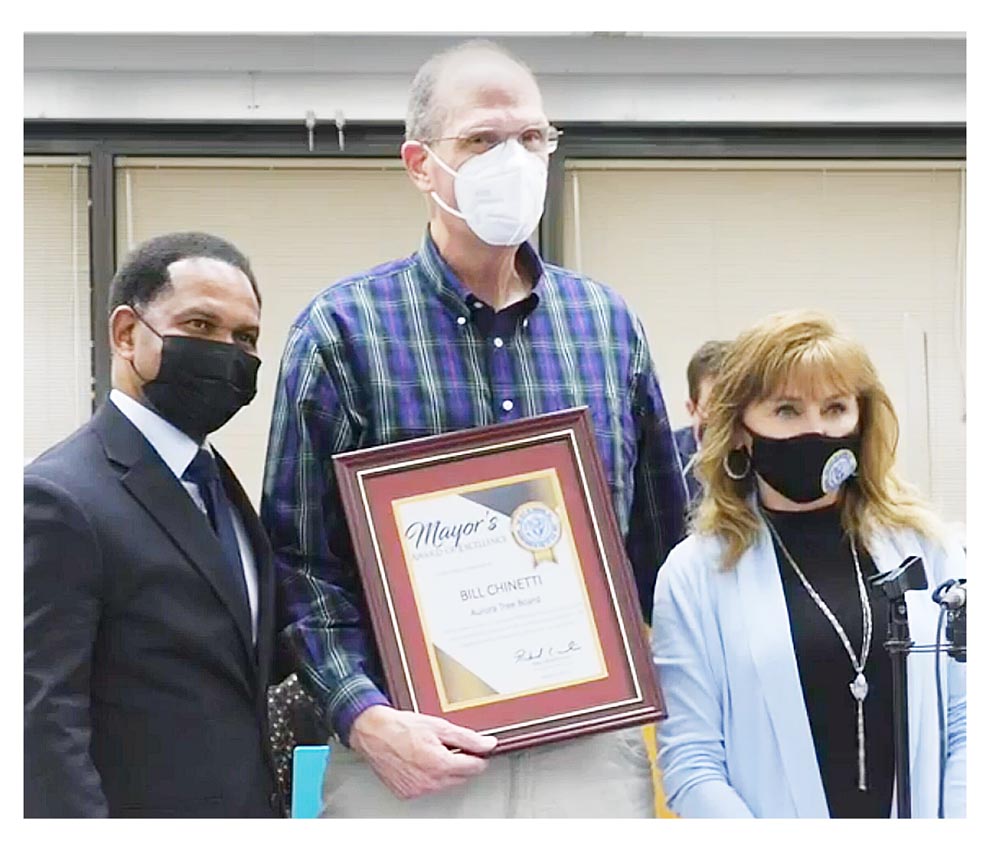By Jason Crane
Mayor of Aurora, Richard Irvin presented the Mayor’s Award of Excellence to individuals for their dedication to serving others at the Aurora city government City Council meeting Tuesday, Jan. 25. The theme was ‘Keeping It 100!’

A proclamation for the 100th Anniversary of the Aurora Noon Lions Club and Mayor’s Award of Excellence was presented to Lions Club members for their service to the Aurora community.
The Mayor’s Award of Excellence was presented to HP24 and More Ministries and executive director Mirella Acevedo, nicknamed Holla Pala (HP) for providing more than 100 home-cooked meals to visitors in Aurora’s Warming Center at the Aurora Transportation Center since January 2021.

The Mayor’s Award of Excellence was presented to Samarth Sreenivas, a sophomore at Oswego East High School who has given more than 100 community service hours teaching piano lessons in order to raise funds to purchase 100 sweaters and books for underserved children in India.

The Mayor’s Award of Excellence was awarded to Bill Chinetti for his decades of service on the Aurora Tree Board and assisting the City’s plan in tree maintenance, expansion and sustainability. Chinetti personifies the Confucius quote “If you think in terms of a year, plant a seed; if in terms of 10 years, plant trees; if in terms of 100 years, teach the people.” His leadership was focus on planting trees and teaching people the importance of trees in our community and world.

• Mayor Irvin requested a moment of silence for Brian Shields, and Ken Thurman, two Aurora Police Officers who recently died from COVID-19.
• Ten individuals expressed concern to the Aurora City Council about a proposed annexation agreement near their homes which could include a warehouse with 37 truck docks.
The proposed annexation agreement of 4.84 acres at the northwest corner of Sunrise Road and Meridian Road on the Aurora/Naperville border includes provisions that upon acquisition by petitioner LPC Ferry Road I, LP (LPC), the property will be annexed and rezoned to a PDD (planned development district) as part of the Butterfield Planned Development which includes the future development of a 270,934 square-foot warehouse in unincorporated DuPage County.
Thirty-seven truck docks and 51 truck spaces would face Frieder Lane and 261 automobile parking spaces would be on the border of Ferry Road and Meridian Road.
At the Committee of the Whole meeting last week, Council members were notified the developers had agreed to move the entrance 150 feet north.
The property is owned by Old Dominion Freight Line which proposed in 2016 to build a truck depot development and eventually withdrew its bid and built a truck depot in neighboring Montgomery in 2017.
The annexation agreement was unanimously passed, 11-0 by the Aurora City Council.
The City Council approved the following agenda items:
• Approved was a Resolution authorizing the appointment of Lillian Feinberg to the Aurora Youth Council.
City government of Aurora documents show in June 2021, the City Council approved changes to Chapter 2, which included a sunset provision for all board/commission members.
• Approved was a Resolution authorizing the execution of two development agreements that allows for the conveyance of the Todd School (100 Oak Avenue) and the Lincoln School (631 South Lake Street) to Visionary Ventures NFP Corporation and sets forth other terms regarding redevelopment of these shuttered schools with affordable housing and a public health facility to include approval of $2,900,000 of Federally Funded Home Investment Partnerships Funds (HOME) and $600,000 of Community Block Grant (CBDG) Funds to Support These Projects. The name listed is Fox Valley Apartments, affordable workforce housing.
City government of Aurora documents show after taking title to both schools, subject to an IGA with School District 129 that was previously authorized in December 2020, the city government is seeking to donate these schools to Visionary Ventures for the purpose of facilitating the construction of 47 new, affordable, units and a new public health-care facility, or another social service agency, charitable organization, health-related facility, or similar use not operated for pecuniary profit, “Healthcare Facility”; for the exclusive use of residents of the District with school-age children.
Visionary Ventures NFP Corporation is a nonprofit organization which has a mission to bring affordable housing, economic development, and services to Native Americans and other underserved populations and communities. The company is led by Shelly Tucciatelli, a longtime industry professional with more than 20 years of experience in management, training, administration, and development of affordable housing and community development.
Supporting partners are Cordogan Clark, the Aurora-based architectural, engineering, interiors, planning and construction firm, and MR Consulting Services, whose majority principal is Michael Poulakidas; the company provides asset management, marketing, contracting, and construction management services, for its own and third-party projects.
Visionary Ventures is planning to deliver a mix of studio, one, two- and three-bedroom units, totaling 47 units in three buildings, and approximately 5,000 square feet for the construction of a public health facility which will provide community benefits in the form of free and subsidized care, and community-based initiatives for the exclusive use of residents of the District with school-age children. The company intends to make use of federal and historic tax credits to finance this redevelopment in addition to credit allocations that have been conditionally approved by the Illinois Housing Development Authority (IDHA).
• Todd School was built in 1934, northwest of downtown Aurora and sits on 1.12 acres. The currently-vacant school building would be redeveloped to accommodate 11 units on two stories. Its interior still features Works Progress Administration (WPA) murals and sculptures that will be preserved.
• Lincoln School was built in 1892 on the southwest side of Aurora and sits on 2.69 acres. The property would contain 36 units, including 14 in the existing building and 22 in a newly-constructed building.
Affordability is defined by HUD in terms of the percentage of the “median family income” (MFI) within a defined geographic area; Aurora is included in the Chicagoland region to determine affordable rent and income limits.
In general, approximately 30% of the units (17) to be delivered will be reserved for individuals or families that earn 30% of the median family income ($27,950 for a family of four) and approximately 70% of the units would be rented to individuals or families that earn 60% ($55,920 for a family of four) of the area median family income. Qualified tenants will earn in the range of $15,900-$63,000 annually.
The range of rents is from approximately $423 per month to $1,284 per month with the average rent approximately $968 per month. The rental population would come primarily from existing Aurora residents with five units designated for tenants that come from the Statewide Referral Network (SRN). SRN units are targeted for households earning at or below 30% of the median income with a head of household who has a disability or illness, including, but not limited to, a physical, developmental substance abuse disorder, HIV / AIDS, or is homeless, or at risk of homelessness.
The City government would provide $2,900,000 in HOME Investment Partnerships funding in the form of a 30-year forgivable loan for the affordable housing component of this development. Visionary Ventures will not be required to make annual payments and if all terms of the agreement are met, the loan will be forgiven in its entirety 30 years from the date of project completion. The loan would be secured by a signed development agreement, mortgage, note, and land use restriction agreement as required by the regulations of the HOME Program. The project’s Development Agreement is included.
The City government would provide $600,000 in CDBG funding in the form of a five-year forgivable loan for the public health facility component of this development, which facility would be transferred to the School District upon completion. Neither Visionary Ventures nor the School District will be required to make annual payments and if all terms of the agreement are met, the loan will be forgiven in its entirety five years from the date of project completion. The loan would be secured by a signed Development Agreement, mortgage, and note as required by the regulations of the CDBG Program.
The total developer request from the City government is $3.5 million in gap financing to complete this development.
• Approved was a resolution authorizing an intergovernmental agreement with the Fox Valley Park District for the conveyance and contribution of an unimproved section of Gillette Avenue right-of-way in Ward 6 (alderman Saville).
City government of Aurora documents show the purpose is for the unimproved section of Gillette Avenue right-of-way will become part of the Fox Valley Park District’s Wilbert Walters Park.
The Fox Valley Park District, in partnership with VNA Health Care, is the recipient of a CDBG grant to install adult fitness components along a new 1/3 mile asphalt path at Wilbert Walters Park on North Highland Avenue, just south of West Illinois Avenue. This park is one block north of VNA Health Care. This new “Wellness Walk” will serve VNA clientele and residents of the neighborhood as part of rehabilitation and fitness/wellness programming.
Gillette Avenue extends approximately 210 feet south from West Illinois Avenue, but the unimproved right-of-way for Gillette Avenue runs another 420 feet farther south. The Remnant Parcel is adjacent to the existing Wilbert Walters Park and the Public Works Department has no plans to extend Gillette Avenue. The paving plan for Wilbert Walters Park shows how the proposed Wellness Walk would incorporate the remnant parcel into the Park. If the Intergovernmental Agreement is executed by the City, Fox Valley Park District will draft the deed for transfer of the remnant parcel to the Park District.
• Approved was a Resolution approving ratification for emergency purchase of network infrastructure equipment purchase from, Sentinel Technologies, Inc, 2550 Warrenville Road, Downers Grove, in the amount not to exceed $64,352.00.
City government of Aurora documents show the purpose is to replace failed core network switch equipment at the Aurora Police Department (APD).
On December 15, network services throughout the City network, were negatively affected by a faulty network component that caused a network broadcast storm. This extreme amount of network traffic adversely affected several key applications thus operations on the City network.
After an extended period of analysis, remediation and reconstruction of network traffic, the issue was isolated to the core network switch at APD data center.
As numerous City services are provided from the APD data center, it is critical that this switch be replaced expeditiously to maintain business as usual operations.
Knowing the that global supply chain of computer equipment has been disrupted due to the pandemic, the City’s Chief Information Officer made several contacts and was able to find that Sentinel Technologies identified the only two available refurbished switches in the country that would meet the City’s need for replacement. Given that, the option was to procure or wait 180 days for fulfillment.
Without the replacement of this core switch, City network services including many in Public Safety and City operations will be negatively impacted.
• Approved was a Resolution establishing liquor license fees related to Chapter 6, “Alcoholic Liquor” of the Code of Ordinances.
City government of Aurora documents show the purpose is to update the fee schedule to accurately reflect the current license classifications and to set annual fees for former Class F licensees.
Significant revisions to Chapter 6, “Alcoholic Liquor”, including new liquor license classifications, were enacted on April 14, 2020 pursuant to O20-023. One classification, Class B – On-Site Consumption, was created to include all on-site consumption licenses and allows licensees to sell all alcoholic liquor. Prior to the April 14, 2020 revisions, there existed a Class E – Full Menu Restaurant license that authorized licensees to sell all alcoholic liquor and a Class F – Beer and Wine Restaurant license that authorized licensees to sell only beer and wine. The annual fee for a Class E license was $2,070.00 and the annual fee for a Class F license was $1,815.00. When the new Class B – On-Site Consumption license classification was enacted, all licenses for on-site consumption were converted, pursuant to O20-023, to either Class B – On-Site Consumption licenses, Class C or Class D on-site consumption licenses, allowing all on-site consumption licensees the privilege of selling all alcoholic liquor. This change leaves an annual fee discrepancy of $255.00 between license classifications with the same licensing privileges (former Class E and former Class F). This proposed resolution will assess a yearly licensing fee of $2,070.00 for all Class B licensees. Additionally, this proposed resolution will update the fee schedule to reflect the new license classifications.
The changes enacted to Chapter 6 of the Code of Ordinances on April 14, 2020, did not modify annual fees, although said changes removed the restrictions to the former Class F – Beer and Wine Restaurant licensees and allows former Class F licensees the same licensing privilege as the former Class E – Full Menu Restaurant licensees. All licensees will be required to pay annual licensing fees for the upcoming 2022-2023 license renewal period, therefore it is important that the a fee of $2,070.00 be assessed to all on-site consumption licensees with the exception of the catering license fee that will remain $825.00 per year.
This change will modify the existing fee schedule as enacted by R18-1056 and eliminate the annual fee discrepancy between licensees with Class B – On-Site Consumption liquor licenses and apply fees fairly to all on-site consumption licensees. This change will update license classifications on the fee schedule to accurately reflect current classifications.
• Approved was a Resolution to award a contract to Performance Construction & Engineering, LLC for the Normal Pressure System (NPS) Master Meter Replacement project in the amount of $367,800.00 for the Water Production Division.
City government of Aurora documents show the purpose is to obtain City Council approval to award a contract to Performance Construction & Engineering, LLC of Plano, IL (PCE) for the Normal Pressure System (NPS) Master Meter Replacement project for the Water Production Division (WPD) in an amount of $367,800.00.
All residents of the City of Aurora are provided with potable water from the city owned and operated Water Treatment Plant (WTP). The WTP was originally constructed in 1991/1992 and began operation in 1992. The water treated at the facility is then pumped to two distinct and separate pressure zones, the normal and high systems, which cover the entire City of Aurora. All the water that is pumped to the Normal Pressure System (NPS) flows through a single “master” flow meter which registers the amount of water pumped. This flow information is then used for multiple purposes such as reporting to regulatory authorities, monitoring quantities of water loss, and ensuring proper operation of the WTP’s finished water pumps.
The NPS master meter has been in constant operation since 1992, and over the past several years it has shown decreased measurement accuracy and precision. Accordingly, the WPD has hired several experts from the flow meter manufacturing company to inspect the meter and perform various types of repairs. Unfortunately, the electrical windings in the NPS master flow meter are no longer salvageable and the flow meter is no longer functional. After 29 years of constant operation, the WPD believes that this meter is beyond its useful life and needs complete replacement.
Due to the non-functional condition of the NPS master meter, the WPD hired Crawford, Murphy & Tilly, Inc. (CMT) to perform the necessary design, project administration, and construction observation professional services necessary to complete the project.
The contract to perform the rehabilitation work was publicly advertised on November 28, 2021 (Bid No. 21-76) and bids were opened on December 22, 2021. A total of four bids were received.
The total range of bids received is from $367,800.00 to $562,575.00. CMT provided an engineer’s estimate of $240,000.00 for this project. This estimate is significantly less than the lowest bid amount due to the unprecedented labor and supply chain shortages and the recent pandemic. Even with only four bids received, due to the tight grouping of the two lowest bids (within 7.9% of the lowest bid amount), the WPD and CMT believe the bids accurately and fairly reflect the actual construction cost for this project.
Performance Construction & Engineering, LLC submitted the lowest, responsive, responsible bid, in the amount of $367,800.00. CMT has stated that Performance Construction & Engineering, LLC has completed numerous underground piping projects with a similar scope of work and are qualified to complete this project. Therefore, the WPD recommends Performance Construction & Engineering, LLC as the lowest responsive, responsible bidder for this project.
The Local Preference Ordinance did apply to the bid, however, it did not impact the low bidder recommendation.
The WPD requested funding in the Capital Improvement Program to complete this work via CIP #I045 which was approved, and funding has been carried-over to the 2022 budget in the WPD’s budget account.
Without completing this replacement project, the existing capital infrastructure (NPS master meter) will continue to remain non-functional.
• Approved was a resolution to award a contract to Strand Associates, Inc. in the amount of $1,144,000 for the Rathbone CSO Preliminary Engineering Services. (Ward 4/alderman Donnell)
City government of Aurora documents show the purpose is to evaluate project alternatives for the proposed Rathbone Combined Sewer Overflow (CSO) facility, which is an essential component of the City’s CSO Long Term Control Plan.
More than a century ago, cities across the United States, including Aurora and other communities up and down the Fox River, built combined sewers that took both sewage and stormwater away from homes and streets and discharged directly into the River. In 1927, decades before the U.S. Environmental Protection Agency (USEPA) began requiring sewage treatment, forward-thinking Aurora residents supported the construction of a sewage treatment plant and new sewers. Those combined sewers are still in operation and carry sewage and waste to the Fox Metro Water Reclamation treatment facility in Oswego, which cleans the water before returning it to the Fox River.
The combined sewer system can handle Aurora’s typical volume of both sewage and runoff, but during heavy rainstorms and snow melt, too much water floods the sewers. When that happens, untreated sewage overflows into the Fox River or backs up into basements. Such occurrences are called a combined sewer overflow, or CSO.
As a first step toward solving this problem, Aurora and other cities across the country eventually began installing more modern storm sewer systems separate from the sewers that carry sewage from homes and businesses. The USEPA’s 1994 CSO Control Policy required communities like Aurora to further develop and implement a CSO Long Term Control Plan (LTCP). Aurora’s LTCP was submitted in 2010 and approved by the Illinois Environmental Protection Agency (IEPA) in 2015. The Plan relies on various strategies ranging from sewer separation and green infrastructure to the construction of storage and treatment facilities. The City has spent more than $50 million so far, primarily on sewer separation and green infrastructure projects. The next phase involves the design and construction of a CSO storage and treatment facility near the intersection of Rathbone Avenue and Sard Avenue, as well as a new sewer crossing the Fox River, and a new pump station. The estimated cost of these improvements is approximately $100 million.
The scope of services for this preliminary engineering contract includes: Updating the City’s sewer model to reflect sewer system improvements constructed since 2010 and to determine the storage capacity needed at the proposed facility; obtaining a topographic survey of the project area; taking soil borings at the site to determine soil bearing capacity, groundwater depth, depth of bedrock, and suitability of the soil for offsite disposal; evaluating construction methods for the proposed river crossing; evaluating alternative pump station locations; estimating the cost of project alternatives; and updating the City’s Long Term Control Plan based on the preferred alternatives.
The City issued a request for qualifications on August 26, 2021 to over 300 vendors in the professional services category. Statements of qualifications were received from five firms on September 15, 2021. This was a qualifications-based selection process for professional services. Since it was qualifications-based, the Local Vendor Preference Ordinance does not apply.
Strand Associates, Inc. was selected as the most qualified firm by a five person review panel. After being notified of their selection, Strand Associates, Inc. prepared the proposal which includes a baseline scope of services with a not-to-exceed fee of $1,009,900 and additional tasks that may be added at the direction of City staff members with a not-to-exceed fee of $134,100. Account 281-1856-512.73-09 has a balance of $1,300,000.
• Approved was a Resolution to ratify the request for payment of services provided by Brandt Excavating, Inc. in excess of $50,000 and in the amount of $52,739.08 for the lead water service replacement contract.
City government of Aurora documents show Brandt Excavating was contracted via the public bidding and procurement process to replace leaking lead water services requiring replacement. The lead water service line replacement policy was revised in September 2021 to add the replacement of the service portion on private property which doubled the cost of each replacement and accelerated the expenditure of the available funds.
This $800,000.00 contract was originally approved in December 2019 by City Council (R19-426) for the replacement of lead water service lines and a $160,000.00 change order was approved by City Council in early November to be used for the remainder of 2021. A contract for 2022 replacement was approved by City Council on 12/14/21 but funds were exhausted in the current contract on December 20th, 2021. Unfortunately, there were six services that started leaking in late 2021 that required replacement prior to the start of the 2022 contract. The cost to replace those services above the amount approved by City Council was $52,739.08. Due to the unpredictable number of services that will start leaking, the emergency nature that requires a quick replacement, and the lack of time and Committee/Council meetings during the end of year holidays, there was not an opportunity to request an additional change order before the work needed to be completed. With the cold weather late in December and the freezing nature of the leaking water from the services, it was decided not to take the risk and wait until January 2022 to replace the six water services.
Sufficient funds are available in account number 510-4058-511-73-02 to satisfy payment to Brandt Excavating, Inc. for the $52,739.08 spent over the City Council approved $960,000.00 for duration of this contract.
The vendor has no outstanding debt with the City.
• Approved was an Ordinance Amending Chapter 2, Article VI, to reflect the appropriate history of the changes to the Boards and Commissions ordinances in Municode.
City government of Aurora documents show the purpose is to provide a redline version of the updated Boards and Commissions ordinance which reflects the additions, deletions and history of Chapter 2, Article VI.
This past summer and fall the Boards and Commissions ordinance was completely re-written and replaced in five separately approved sections. The approved versions of the ordinance only contained the new text and did not include a formal redline.
This Ordinance includes a formal redline which shows the old ordinance language as stricken, the new language added, the sections that were replaced, the sections that remain reserved, and the sections that were repealed and reserved as a result of the new ordinance.
The Ordinance provides a clean redline of the previously amended ordinance for purposes of the Clerk’s record keeping and updating Municode.

